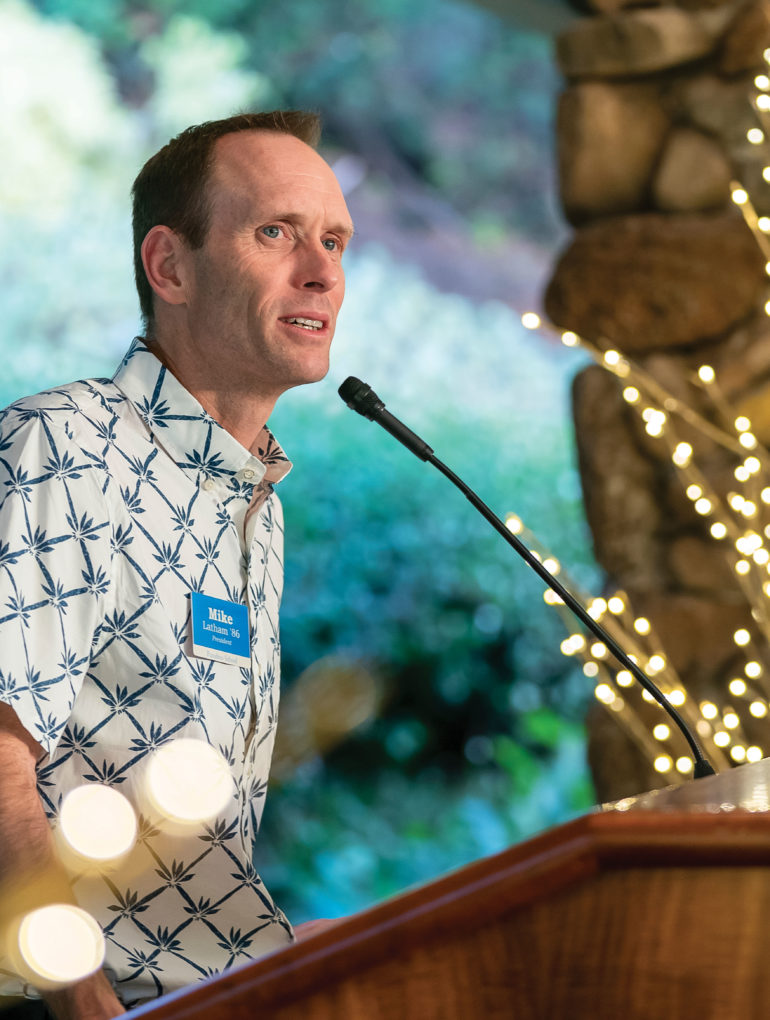By Mike Latham ’86
Over the past 23 years as a history professor, dean and vice president at Fordham University and Grinnell College, I have taught and advised thousands of students. I have particularly enjoyed teaching first-semester freshmen – students just setting out on a journey, trying to find a sense of personal meaning and purpose to go with their new independence. What is it, I have wondered, that allows so many of them to thrive? What is it that enables them to achieve not only academic success, but also a greater degree of confidence and self-knowledge? What is it that enables them to grow and mature, ready to make the most of the experience standing in front of them? As reflect on my years of teaching and mentoring, I believe there are clear lessons for us as we support students at Punahou.
First, students who thrive take full ownership of their education, pursuing each chance to grow, explore and change. As a Punahou student myself, I was often concerned with what I was good at. How could I distinguish myself? Where could I achieve distinctive excellence? There is nothing wrong with such questions, of course, and I did derive a sense of confidence and identity from achievement. But it was only toward the end of my time at Punahou that I realized that the question, “What am I good at?” was not nearly as important as the questions, “What am I curious about?” “What do I care about?” or “What really matters to me?”
While it may sound counterintuitive, I have become convinced that if students focus too tightly on a narrow vision of achievement, they may be tempted to avoid the kind of exploration and self discovery that a place like Punahou really should promote. Students who thrive are motivated not only by external factors like grades or awards. They are also propelled by internal or intrinsic drives that allow them to discover talents, abilities and interests they didn’t know they had. Sometimes the greatest knowledge one can gain is not only about history, math, Spanish or chemistry, but about one’s self.
Students who thrive also develop a “growth mindset,” a concept popularized by the Stanford psychologist Carol Dweck. They recognize that their capabilities are not fixed, and that they can improve and excel even in the areas that don’t come easily to them. Rather than, “I’m not good at
geometry,” “I can’t draw” or “I just can’t learn French,” they recognize that with effort and support, they can succeed. Kids with this attitude are more inclined to declare, “I’ll work on this,” “I’m sure I’ll get better” or “I don’t know how to do this yet, but I soon will!” These are students who embrace a challenge and lean into difficulty instead of fleeing from it. They also focus less on the next “A” on a test or where they stand in relation to their peers and more on the process of learning itself.
As a Punahou student, math did not always come easily to me. I performed adequately, but often felt much less capable than the astoundingly brilliant kids around me. During my senior year, however, a remarkable teacher named Carl Wheeler convinced me that I could in fact learn calculus. By reminding me of the distance I’d traveled and showing me each week that my hard work really paid off, he raised my level of confidence. By enabling me to see the beauty of the problems I worked on, he also deepened my curiosity and changed my motivation. Well beyond mathematics, he helped me learn how to learn.
Finally, students who thrive pursue a passion and become part of a community. Much like college, Punahou can be a demanding, academically charged place, and students need to allocate their time carefully. But it is often outside of class that students find the sense of joy and belonging that promotes lasting balance and wellness. Whether through community service, art, music, theatre, athletics or any other activity, students who thrive build sustained relationships with a group of peers that they can learn from and grow with. As a cross country and track runner at Punahou, I spent countless hours in training, competition and traveling to events. But the lessons of discipline and teamwork I learned on athletic fields spilled over into the rest of my life in ways that I now understand were truly priceless.
As parents and teachers, we can encourage these six behaviors. We can continue to ask kids what they are curious about and what inspires them, instead of focusing only on what appears to come easily. Instead of merely praising talent or achievement, we can also emphasize the value of hard work and effort, reminding kids that their horizons are not fixed, and that improvement really is possible. We can encourage students to step outside their comfort zones, to explore and to try something new. And finally, we can help our kids learn to lead more full, rich and well-balanced lives as they find their own paths forward. At its best, the liberal arts ethos underlying a school like Punahou should truly liberate our students, pointing them not only toward possible college choices or career areas, but also toward lives of deeper meaning and purpose.

